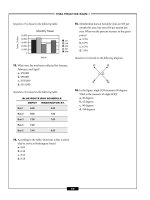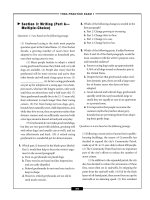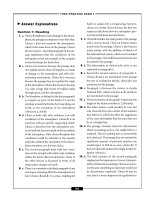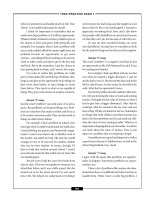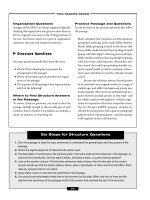Using the Dictionary
Bạn đang xem bản rút gọn của tài liệu. Xem và tải ngay bản đầy đủ của tài liệu tại đây (91.29 KB, 12 trang )
29
CHAPTER
3
U
SING THE
D
ICTIONARY
To understand and
remember what you read,
you need to understand
each word in the text.
This chapter will show you
how you can use the
dictionary to improve
your reading skills.
I
magine you are in a New York City subway station
waiting for a train when you hear an announcement coming over
the loudspeaker:
Ladies and gentlemen, please....the train....doors....
next station....express....the approximate . . . please do
not....your safety....and give....thank you.
How are you supposed to understand the announcement? It’s nearly
impossible; you weren’t able to hear half of the words in the message.
READ BETTER
,
REMEMBER MORE
30
Similarly, how can you understand what you read if you don’t know what
some of the words mean?
Many people would understand and remember much more of what
they read if they simply had a larger vocabulary. In fact, a limited vocab-
ulary is often what frustrates people more than anything else when it
comes to reading. The solution is to work steadily on
improving your vocabulary. And the first step is to
get in the habit of looking up any word you come
across that you don’t know. Even if you are just
going to sit down with the Sunday paper, sit down
with a dictionary. Any college edition will do.
Don’t think of it as work; think of it as an invest-
ment in your future. It may be slow going at first, but as you build your
vocabulary, you will spend less and less time looking up words. You’ll
also become increasingly confident as a reader.
READ THE ENTIRE DEFINITION
Just about everyone who can read can look up a word in a dictionary. But
not everyone knows how to take advantage of all the information a
dictionary definition offers. The more you know about a word, the easier
it will be to remember what that word means and how it is used.
Readers often cheat themselves by looking only at the first meaning
listed in a dictionary definition. There’s a lot more to a dictionary entry
than that first definition. Many words have more than one possible
meaning, and other information provided in the definition can help you
better remember the word.
To show you how much a dictionary definition has to offer, let’s take
the word leech as an example. If you were to look it up in a dictionary,
you might find the following definition:
leech (le¯ch) n. 1. a small bloodsucking worm usually living
in water. 2. a person who drains the resources of another.
Following the word leech, is the phonetic spelling of the word—that
is, the word is spelled exactly how it sounds. This tells you exactly how to
pronounce it. Next, the abbreviation (n.) tells you the word’s part of
Look It Up
When you read, look up
every word you don’t
know.
USING THE DICTIONARY
31
speech. N stands for noun. (You’ll see more on this later in the chapter.)
Then, you learn that the word has two related but distinct meanings:
•
A bloodsucking worm
•
A person who drains the resources of another
USE CONTEXT TO PICK THE RIGHT MEANING
Because leech has two distinct definitions, you have to decide which defi-
nition works best in the context of the sentence. The context is the words
and ideas that surround the word in question. How is the word being
used? In what situation? For example, which meaning for leech makes the
most sense in the context of the following sentences?
Larry is such a leech. He’s always borrowing money and
never pays me back.
Clearly, the second meaning of leech, “a person who drains the
resources of another,” makes the most sense in the context of this exam-
ple. The second definition describes a person; the first definition
describes a water-dwelling worm. Notice that if you had closed the
dictionary after reading only the first definition, the example above
wouldn’t make sense.
Here’s a sentence in which the first meaning of leech would make sense:
Hundreds of years ago, doctors often used leeches to suck the
“bad blood” out of patients.
Leech has two very different definitions. One defines a type of worm,
the other a type of person. But you should be able to see that those defi-
nitions are actually very closely related. After all, a person who is a leech
sucks the resources (money, food, material possessions, or whatever)
from someone the way a leech worm sucks the blood out of a person.
Both types of leeches are a drain on whomever they attach themselves to.
P
RACTICE
1
Look up the word slam. Then, decide which meaning of the word makes
the most sense in the context of the following sentence:
READ BETTER
,
REMEMBER MORE
32
The critics slammed his new film.
Answer:
Slam has three meanings:
1
. to shut forcefully with a loud noise
2
. to put or knock or hit forcefully
3
. slang to criticize severely
The third, slang meaning is clearly the one that makes the most sense in
the context of the sentence.
PARTS OF SPEECH
You can distinguish between the two different types of leeches and place
them in the proper context. But what if you come across leech in a
sentence like this?
“Stop leeching off of me!” he yelled.
Neither of the previous definitions work in this sentence. That’s
because in this sentence, leech is no longer a noun—the name of a
person, place, or thing. It’s now a different part of speech. And words
change their meaning when they change their part of speech.
A word’s part of speech indicates how that word functions in a
sentence. Many words in the English language can function as more than
one part of speech. They can be only one part of speech at a time, but
they can shift from being a verb to a noun to an adjective, all in the same
sentence. Here’s an example:
The dump truck dumped the garbage in the dump.
It sounds funny to say “dump” in one sentence three times, but each
time the word is used it has a different function—a different part of
speech.
There are eight parts of speech, but let’s only focus on the four that are
most likely to affect meaning: noun, verb, adjective, and adverb. Read the
definitions of these parts of speech carefully:
USING THE DICTIONARY
33
Parts of Speech
Noun (n.) a person, place or thing (for example, woman,
beach, pencil)
Verb (v.) an action or state of being (for example, go, shout, be,
feel)
Adjective (adj.) a word that describes a (for example, red, happy,
noun slow, forty)
Adverb (adv.) a word that describes a (for example, happily,
verb, adjective, or another slowly, very, quite)
adverb
Parts of speech are important because, as you’ve already seen, words
change their meaning when they change their part of speech. When you
look in the dictionary, be sure you’re looking up the proper definition. In
other words, if a word has different meanings for its different parts of
speech, then you need to be sure you’re looking at the right part of speech.
P
RACTICE
2
Use the definitions of the four parts of speech (noun, verb, adjective, and
adverb) to determine the parts of speech of the underlined words below:
1
. The dump truck dumped the garbage in the dump.
ab c
2
.Her memory faded slowly as she neared 100.
a b c
Answers
1. a
.Here,dump is used as an adjective. It describes the truck, which
is a noun. It answers the question “What kind of truck?”
b
.Here,dumped is a verb. It shows the action that the truck
performed.
c
.Here,dump is a noun. It’s the place where the truck dumped the
garbage.



